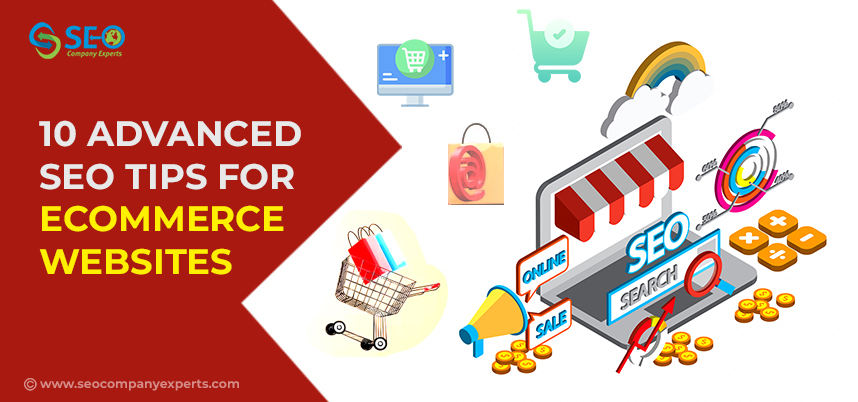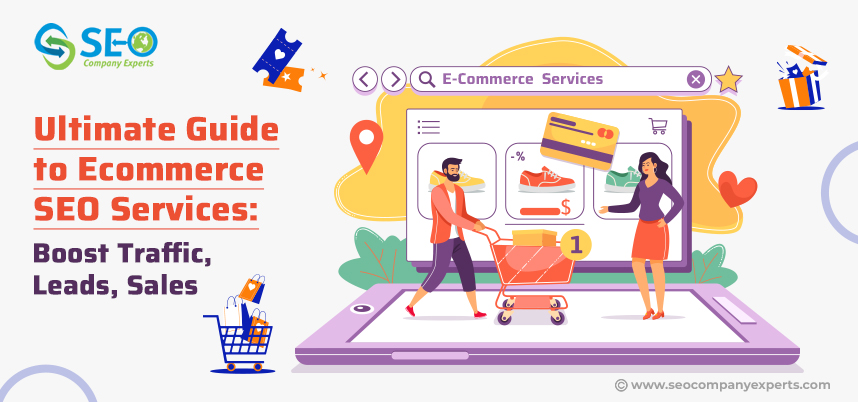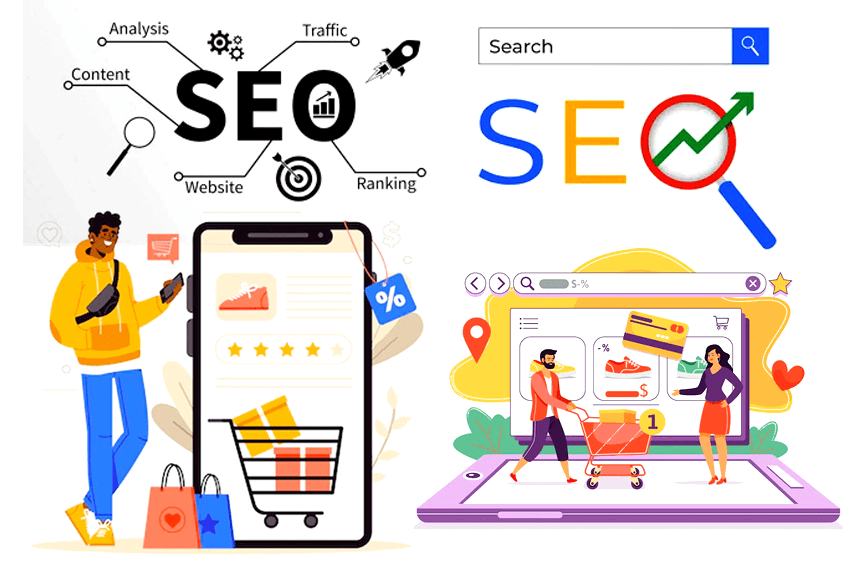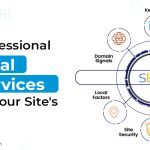
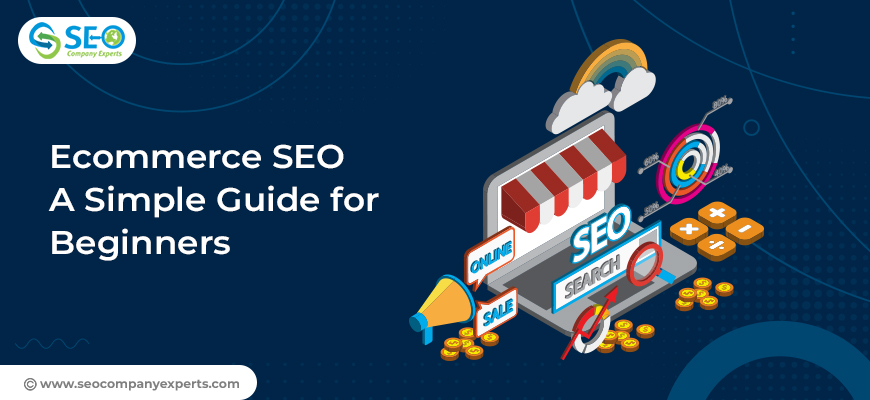
E-commerce SEO holds immense significance within the domain of online commerce. It is a crucial factor in elevating the visibility of your products across Google and other prominent search engines’ organic search outcomes. Every online store wants to drive more traffic and increase sales, and e-commerce SEO services in the USA could be the perfect way to do that.
But why is e-commerce SEO so vital? It ensures that your products appear in search results amidst the staggering 8.5 billion searches conducted daily on Google alone.
This guide explains what it is, why it is essential and how to go about e-commerce SEO services.
Ready to boost your sales? Let SEO Company Experts help you grow your online store today.
What is E-Commerce?
E-commerce means buying and selling things online. It’s like shopping on the internet. Making an online store appear more in Google and Bing searches is essential.
Current estimates show that the global e-commerce market hit $6.3 trillion in 2024 and is on track to keep growing in the coming years. And by 2026, it might be over $8.1 trillion. In the US, it’s estimated that in 2023 alone, people will spend over $1 trillion online.
This change isn’t just about money; it’s also changing how people shop. In 2023, about 218.8 million Americans are expected to shop online; by 2026, it might be around 230.6 million. They are making it critical for ecommerce owners to invest in SEO and advanced ecommerce SEO.
So yeah – that’s a lot of sales.
Common tasks associated with ecommerce SEO services are:
- Performing keyword research
- Improving Site Structure
- Optimizing for on-page SEO elements (which means improving the content of your web pages)
- Creating quality content.
- Creating backlinks (links from other sites pointing to your site) and more.
How to create an E-commerce SEO Strategy?
If you’re new to making your online store more visible on Google SERP, follow these steps these steps are followed by the best ecommerce SEO agency in the USA
This will give easy tips for setting up basic SEO for your website.
E-commerce Keyword Research
In e-commerce, the first step is to conduct keyword research, which every ecommerce SEO company religiously follows. You know what? Keyword research is significant for e-commerce websites.
This entails identifying the keywords people use to search for your products to purchase. These keywords can help your website pages rank higher and attract more visitors to your website.
There are four kinds of search intent keywords available. They are:
Navigational keywords help users find specific websites or pages. For instance, “Netflix login” or “Amazon login.”
Informational Keyword: People want to learn more about something, such as “how much food to feed my cat.”
Commercial Keyword: Consumers should compare products before making a purchase decision. For example, “Best Dry Cat Food.”
The transactional keyword refers to online purchases. For example, “Buy cat food online.”
Improve Site Architecture for your Online Store
Regarding E-commerce SEO for your online business, site architecture is critical to improving search results and page indexing.
Good website architecture allows users and search engines to navigate your store effortlessly.
- Maintain a simple site structure that may grow with your store.
- Ensure that every page is easily accessible with just a few clicks.
- Refrain from removing products or category pages frequently. It will have an impact on your website’s architecture and make it more complex for visitors and search engines.
- Makes it easier for users to locate products.
- Transferring link equity across the entire website will increase ranking.
Here are some simple suggestions by the best Ecommerce SEO company to improve your e-commerce site architecture:
- Simplify Navigation
- Organize by Categories
- Optimize Product Pages
- Implement Search Functionality
- Mobile-Friendly Design
- Prioritize Key Pages
Improve Technical SEO
Improving your website’s structure is merely one aspect of technical SEO. There are other crucial things to consider.
Some crucial technical SEO considerations for e-commerce websites are:
Website Speed
Ensure rapid loading times to improve user experience and search rankings.
Mobile-friendly design
Optimize the website for mobile devices to reach a wider audience. Ask your e-commerce web design services provider to make the design mobile-friendly, and most users will visit the website via their mobiles.
Structured Data Markup
Structured data can help search engines interpret your content better.
SSL Certificate
Secure your website with an SSL certificate to ensure data confidentiality and integrity.
XML Sitemap
Create and submit an XML sitemap to help search engines index your sites.
Robots.txt file
Use a robots.txt file to instruct search engine crawlers on what to crawl or avoid.
Canonical URLs
Use canonical tags to prevent duplicate content concerns.
Optimized images
Compress and optimize photos to improve loading times. Nowadays, website owners optimize their photos from PNG and JPG to web format.
URL Structure
Create clear, user-friendly URLs to increase visibility.
Structured navigation
Organize the site navigation rationally for both users and search engines.
Focusing on technical SEO variables improves an ecommerce website’s performance and visibility in search engine results.
Optimize On-page SEO
According to the best e-commerce SEO services provider, effective on-page optimization is crucial for better search engine visibility.
Key on-page SEO factors are,
Keyword Optimization
Optimize product titles, descriptions, and meta tags with relevant keywords to boost search visibility and attract potential customers.
High-Quality Content
Craft compelling, informative content for product pages and blogs to elevate quality. Engage your audience while offering valuable insights, enriching user experience and bolstering your ecommerce store’s credibility.
User-Friendly URLs
Craft concise, SEO-friendly URLs to enhance user and search engine comprehension of your web content. Clear and descriptive URLs bolster user experience and boost website accessibility.
Optimized Product Images
Use high-quality images and add descriptive alt text. This boosts your site’s visual appeal and aids accessibility for screen reader users. Well-optimized images enhance user experience and SEO.
Product Reviews
Share customer reviews on your website to build trust. Positive feedback helps shoppers feel confident in their purchases. Displaying reviews boosts product credibility and makes online shopping more reliable.
Create Better Calls-to-Action (CTAs)
Clear CTAs boost engagement and improve the online shopping experience by guiding visitors to buy, sign up or explore further.
Internal Linking
The best e-commerce SEO company suggests connecting products and pages on your e-commerce site for smoother navigation. This helps users find what they need quickly and improves their experience. Plus, it helps search engines understand your site better, boosting your rankings. Focusing on these SEO tactics can lift your ecommerce site’s search rankings and make browsing more enjoyable for users.
Create Blogs
Blogging helps your website show up more often in online searches by using SEO techniques. It tells search engines that your site is reliable for specific topics your audience cares about. Here’s why blogs matter for online stores:
Create Informative Content
Blogs give helpful details about products, how to use them, and why they’re beneficial. This helps shoppers make intelligent choices when buying.
Updating Blogs Increase Visibility
Updating your blog regularly boosts your site’s ranking on search engines. This means more people see your products when they search online.
Increase Authority (EEAT)
Well-written blogs show you know your stuff, earning trust from customers who see you as an expert.
Promotional Opportunities
Blogs aren’t just for info—they’re also great for advertising products, sharing deals and letting customers know about special offers, encouraging them to buy.
Share & Promote Your Blog Content
Share on Social Media
Post your blog on platforms like Facebook, X (formerly Twitter), Instagram, and LinkedIn. This will let people know about your blog and bring them to your website.
Email Subscribers
Send your blog to people who have subscribed to your emails. A well-crafted email not only attracts more visitors but also boosts sales.
Engage in Online Communities
Join forums or Facebook groups where your target audience hangs out. Instead of just dropping links, participate in discussions and share your blog only when relevant to the conversation.
By following these steps, more people will discover your blog. Integrating blogs into your e-commerce site improves the overall customer experience, increases sales and builds a loyal customer base.
Improve Link Building
When determining website rankings, Google mainly focuses on two things: content and links. One way to improve your website’s ranking is by getting backlinks from reputable sites. Here are eight straightforward ways to build links:
Resource Page Link Building
Find pages related to your industry and contact them to collaborate.
Partnering with Influencers
Connect with influencers in your field and ask for links through blog features or their website.
Broken Link Building
Use tools to find broken links on relevant websites and suggest your content as a replacement.
HARO Link Building
Respond to journalist queries in your industry and earn backlinks when your insights are featured in articles.
Competitor Link Analysis
Use tools to see where your competitors are getting links and try to get similar ones for your site.
Guest Posting
Write posts for other blogs or websites to gain links and build relationships.
PR Link Building
Distribute newsworthy content to media outlets to attract attention and earn backlinks.
Skyscraper Technique
Create exceptional content that surpasses existing popular content and reach out to sites linking to the original.
These strategies can enhance your link-building efforts and boost your website’s search engine rankings.
Measure SEO Performance
Measuring the performance of your e-commerce SEO efforts is crucial for optimizing your website’s performance and ensuring its success in the competitive online landscape.
How To Measure E-commerce SEO?
Website Traffic Analysis
Use tools like Google Analytics to study visitor demographics and site navigation. Pay particular attention to organic traffic to gauge SEO effectiveness.
Keyword Performance
Evaluate keyword performance using tools like Ahrefs or Semrush. Identify top-ranking keywords driving organic traffic and prioritize optimization for relevant ones.
Conversion Rates
E-commerce SEO aims to boost conversions. Keep tabs on conversion rates across various pages and products. Assess SEO’s influence on product pages, landing pages and checkout. A well-optimized site should show increased conversion rates over time.
Bounce Rate
Monitor bounce rates to gauge website engagement. High rates suggest visitors aren’t satisfied. Improve landing pages, product descriptions and user experience to lower bounce rates, which is crucial for SEO rankings.
Page Load Speed
Optimize user experience by boosting page load speed. Slow loads cause higher bounce rates and lower rankings. Try Google PageSpeed Insights to enhance your site’s speed.
Backlink Profile
Evaluate your site’s backlinks using tools like Moz or Ahrefs. Quality links from reputable sites boost search rankings.
Mobile Responsiveness
Optimize your e-commerce site for mobile. Google ranks mobile-friendly sites higher. Test and enhance mobile responsiveness with Google’s tool.
Customer Feedback
Monitor customer feedback and reviews closely. Positive feedback enhances SEO by fostering trust and credibility. Address any issues promptly.
E-commerce Analytics
Utilize e-commerce analytics tools from platforms like Shopify or WooCommerce to gain valuable insights on product performance, sales trends, and customer behavior tailored to your online business.
Competitor Analysis
Analyze competitors’ SEO strategies, including their targeted keywords, acquired backlinks, and overall tactics, regularly for valuable insights.
Conclusion
In the world of online selling, getting found by your ideal customers is critical to run a successful business. E-commerce SEO alongside digital marketing services is like your secret weapon—it helps your store appear when people search online. Every step counts, from picking the right words to ensuring your site works well.
If you’re looking for the best e-commerce SEO agency in the USA, then we can help. At SEO Company Experts, we specialize in making your online shop stand out. Whether picking the best words, ensuring your site runs smoothly or getting other websites to link to yours, we’ve got you covered. Besides being the best SEO agency, we are the leading digital branding agency. Our team knows the ins and outs of E-commerce SEO and we’re here to help you succeed.




